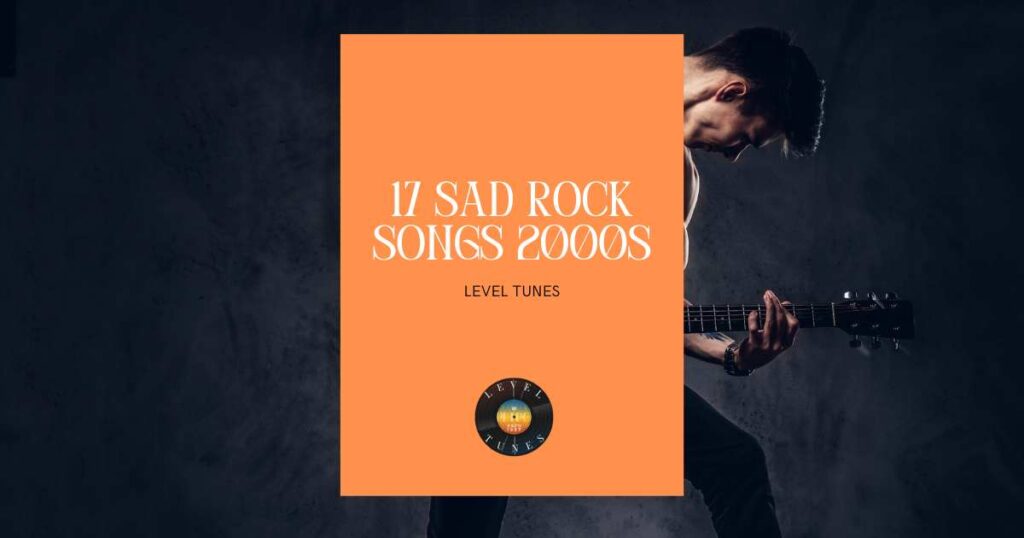17 Sad Rock Songs 2000s: Reflective Side
Hey there, fellow music lovers and DJs! It’s TBone here, the heart and soul behind Level Tunes.
With over 20 years of experience in the music industry, spinning decks and sharing tunes, I’ve developed a deep love for all genres of music, but rock has always held a special place in my heart.
Today, I’m diving into the more emotional side of things with a list of 17 sad rock songs from the 2000s.
This era was rich with tracks that could tug at your heartstrings, and I believe they deserve a spotlight.
I chose these songs not only because they resonate with me personally but also because they’ve touched the lives of many around the globe.
Whether you’re a DJ looking to add some depth to your setlist or a music enthusiast on the lookout for songs that speak to the soul, this list is for you. Let’s explore the melancholy beauty of these tracks together.
Here are the sad rock songs 2000s that you can check out:
List Of Sad Rock Songs 2000s
Sad rock songs 2000s in a list format:
“How to Save a Life” by The Fray
Released in 2005 on their debut album of the same name under the Epic Records label, “How to Save a Life” is a song that has touched millions with its compelling narrative and haunting melody. The song was inspired by lead singer Isaac Slade’s experiences working at a camp for troubled teens, making its message on communication and intervention in times of crisis deeply personal. What makes this track stand out is not just its poignant lyrics but the way it builds up musically, from a soft, introspective piano to a powerful, full-band crescendo. It’s a song that showcases The Fray’s ability to blend pop rock with heartfelt storytelling, making it a timeless piece in their catalog.
“Leave Out All the Rest” by Linkin Park
From their 2007 album “Minutes to Midnight,” released under Warner Bros. Records, “Leave Out All the Rest” is a testament to Linkin Park’s versatility and emotional depth. This song delves into themes of legacy and forgiveness, with Chester Bennington’s iconic vocals conveying a sense of vulnerability that’s both rare and moving. The blend of electronic elements with rock, alongside the band’s introspective lyrics, creates a melancholic but uplifting anthem. What draws me to this song is its universal message of wanting to be remembered for the good despite our flaws and mistakes. It’s a powerful reminder of the band’s skill in crafting songs that resonate on a deeply personal level.
“The Scientist” by Coldplay
Coldplay’s “The Scientist,” from their 2002 album “A Rush of Blood to the Head” under Parlophone Records, is a masterpiece of modern rock balladry. Chris Martin’s hauntingly beautiful piano work and heartfelt vocals guide the listener through a narrative of love and loss, with the band’s atmospheric soundscapes adding depth and emotion. The song’s reverse narrative music video is equally compelling, offering a visual reflection of the song’s themes of regret and longing. What captivates me about “The Scientist” is its simplicity and sincerity, qualities that have cemented it as one of Coldplay’s most beloved tracks.
“I Miss You” by Blink-182
Blink-182 took a departure from their punk rock roots with “I Miss You,” a track from their 2003 self-titled album released under Geffen Records. This song showcases a more mature side of the band, with Mark Hoppus and Tom DeLonge’s contrasting vocals painting a picture of longing and heartache. The use of acoustic instruments and minimalistic production highlights the song’s emotional weight, making it a standout track in Blink-182’s discography. The song’s references to Tim Burton’s “The Nightmare Before Christmas” add an intriguing layer of gothic romance, reflecting the band’s diverse influences and creative evolution.
“My Immortal” by Evanescence
Evanescence’s “My Immortal,” featured on their 2003 debut album “Fallen” under Wind-up Records, is a haunting ballad that showcases Amy Lee’s stunning vocal range and emotive piano playing. The song’s lyrical content deals with loss and the lingering presence of a loved one, themes that are universal and deeply affecting. What makes “My Immortal” particularly memorable is its raw emotional power, coupled with the band’s signature blend of rock and classical elements. It’s a song that stands as a testament to Evanescence’s ability to craft music that resonates with listeners on a profound level.
“Fix You” by Coldplay
Another entry from Coldplay, “Fix You” is from their 2005 album “X&Y,” released under Parlophone Records. This song is a soothing balm for the soul, with Chris Martin’s comforting vocals and the song’s uplifting message of support and love in times of sorrow. The gradual build-up to the climactic guitar solo and choir-backed finale is masterfully done, showcasing the band’s skill in creating dynamic and emotionally charged anthems. “Fix You” is a reminder of the healing power of music, and its ability to connect us through shared experiences of pain and hope.
“Untitled” (How Could This Happen to Me?) by Simple Plan
Simple Plan’s “Untitled” from their 2004 album “Still Not Getting Any…” under Lava Records explores the themes of accident and regret in a deeply personal and impactful way. The song’s narrative video, which portrays the consequences of drunk driving, adds a powerful visual layer to its message. What draws me to this song is its raw honesty and the way it addresses a serious issue without preaching. Simple Plan has a knack for connecting with their audience through relatable lyrics and energetic performances, and “Untitled” showcases their ability to tackle heavier emotional themes with sensitivity and grace.
“Wake Me Up When September Ends” by Green Day
From their 2004 album “American Idiot” under Reprise Records, Green Day’s “Wake Me Up When September Ends” is a deeply personal song for lead vocalist Billie Joe Armstrong, reflecting on the loss of his father. The acoustic guitar-driven track marks a departure from the band’s punk rock sound, offering a more introspective and somber tone. What I appreciate about this song is its raw emotional honesty and the universal theme of dealing with grief and the passage of time. It’s a poignant reminder of Green Day’s versatility as artists and their ability to touch on personal experiences with universal appeal.
“Snuff” by Slipknot
“Snuff” is a departure from Slipknot’s usual heavy metal sound, featured on their 2008 album “All Hope Is Gone” under Roadrunner Records. This acoustic ballad reveals a vulnerable side of the band, with Corey Taylor’s emotional vocal performance offering a raw and heartfelt exploration of loss and betrayal. The song’s stripped-down arrangement allows the poignant lyrics to take center stage, showcasing Slipknot’s range as musicians and songwriters. “Snuff” is a powerful testament to the band’s ability to transcend genres and connect with listeners on a deeply emotional level.
“Hurt” by Johnny Cash (Cover of Nine Inch Nails)
Though originally by Nine Inch Nails, Johnny Cash’s 2002 cover of “Hurt” from his album “American IV: The Man Comes Around” under American Recordings and produced by Rick Rubin, brings a new depth of sorrow and introspection to the song. Cash’s weathered voice and simple acoustic backing transform the track into a poignant reflection on life, loss, and regret. What makes this version stand out is Cash’s ability to imbue the song with a sense of personal history and emotional weight, making it a hauntingly beautiful ode to the human condition. It’s a brilliant example of how music can bridge genres and generations, creating a timeless piece that resonates with listeners worldwide.
Fun Facts: Sad Rock Songs 2000s
“How to Save a Life” by The Fray
The song “How to Save a Life” was inspired by lead singer Isaac Slade’s experience as a mentor at a camp for troubled teens. One particular teen was the catalyst for the song’s narrative. Slade’s attempt to connect with him and steer him away from a destructive path led to the creation of this deeply emotional and impactful song. The track eventually became a global hit, partly because of its use in several TV dramas, most notably in “Grey’s Anatomy,” which helped it gain a wider audience.
“Leave Out All the Rest” by Linkin Park
Linkin Park’s “Leave Out All the Rest” showcases the band’s exploration of mortality and the desire to be remembered fondly after death. Interestingly, the music video for the song features the band members in a futuristic, space setting, which was quite a departure from their usual visual themes. This song, along with others from the “Minutes to Midnight” album, marked a stylistic shift for the band, showcasing a broader range of genres and themes.
“The Scientist” by Coldplay
The music video for “The Scientist” is notable for its reverse narrative, with Chris Martin singing the song backwards. This required Martin to learn the phonetic reverse of the lyrics, a process that was both challenging and unique, adding a distinct layer of complexity to the song’s presentation. The effort paid off, as the video perfectly complements the song’s themes of loss and longing with its visually striking and emotionally resonant storytelling.
“I Miss You” by Blink-182
“I Miss You” stands out in Blink-182’s discography for its mature themes and acoustic style, diverging from their typical punk rock sound. The song contains references to “The Nightmare Before Christmas,” particularly in the line, “We can live like Jack and Sally if we want.” This allusion to the Tim Burton movie underscores the song’s themes of longing and companionship, adding a layer of pop culture reference that resonates with fans of the film and the band.
“My Immortal” by Evanescence
Amy Lee, Evanescence’s lead singer, wrote “My Immortal” when she was only 15 years old, making it one of the earliest compositions that would later appear on their debut album, “Fallen.” The song’s enduring appeal is a testament to Lee’s early songwriting talent and emotional depth. The version that appears on the album includes a full band towards the end, a decision that was made later in the production process to add a dramatic climax to the song’s hauntingly beautiful melody.
“Fix You” by Coldplay
Chris Martin was inspired to write “Fix You” after Gwyneth Paltrow, his wife at the time, lost her father. The song was meant as a comforting message to her during her period of mourning. The iconic organ riff that opens the song came from a keyboard that Martin bought for Paltrow as a gift. This backstory adds a personal dimension to the song, highlighting its origins as a gesture of love and support in a time of grief.
Diving into these songs reveals not just the heart of 2000s rock but also the stories and emotions that connect us all. Each track, rich with its own narrative and melody, reminds us why we turn to music in our most reflective moments. Let these songs be a guide to the depths of emotion and creativity that defined a generation.
Thanks for reading.
TBone




